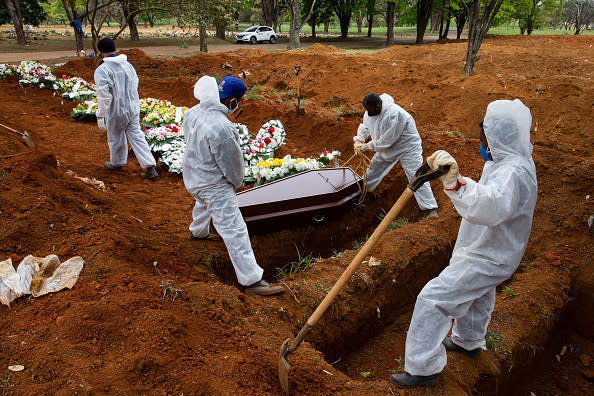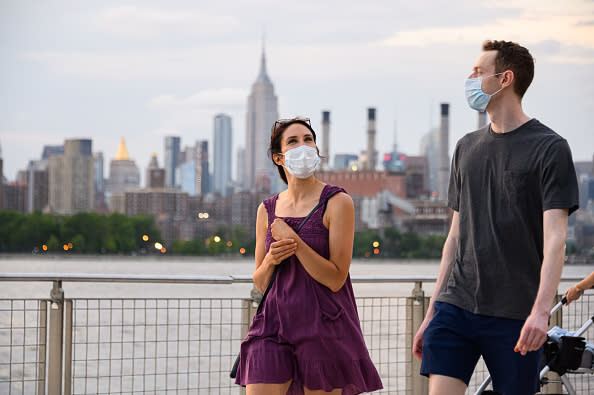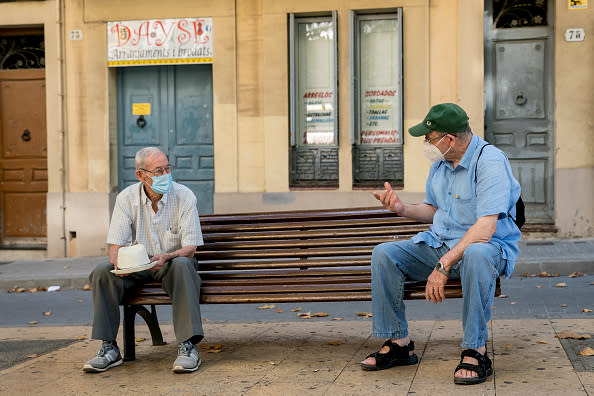Coronavirus: WHO reports world's highest single-day spike in cases
The World Health Organisation has reported the world has seen its largest single-day spike in coronavirus cases with more than 250,000 in 24 hours.
WHO on Saturday again reported a single-day record of new infections with 259,848.
Global COVID-19 deaths have hit 601,549, according to Johns Hopkins University data.
The United States tops the list with 140,119 deaths, followed by 78,772 in Brazil, 45,358 in the United Kingdom and 38,888 in Mexico, where a surge in cases have stalled plans to reopen the economy.
While the US leads global infections, South Africa now ranks as the fifth worst-hit country in the pandemic with 350,879 cases — roughly half of all those confirmed on the African continent.

Its struggles are a sign of trouble to come for nations with even fewer healthcare resources.
China confirmed 13 new cases in the northwestern city of Urumqi on Sunday, while South Korea reported less than 40 additional cases for a second straight day.
The Urumqi outbreak is the latest to pop up since China largely contained the domestic spread of the virus in March.
At least 30 people have been infected and authorities are conducting universal testing in communities where cases were discovered, later to be expanded to other parts of the city and major businesses.
South Korean authorities are also struggling to suppress an uptick in local infections, with 34 additional cases, 21 of them domestic and 13 from overseas, raising the country’s total to 13,745 with 295 deaths.
Both countries are mandating testing and enforcing two-week quarantines on all overseas arrivals.

The number of confirmed infections worldwide has passed 14.2 million, out of which 3.7 million are in the United States.
There are more than two million in Brazil and more than one million in India.
Experts believe the true numbers around the world are higher because of testing shortages and data collection issues in some nations.
Infections are soaring in US states like Florida, Texas and Arizona, fuelled by the haphazard lifting of lockdowns and the resistance of some Americans to wearing masks.
Teams of military medics have been deployed in Texas and California to help hospitals deal with a deluge of patients who are flooding emergency rooms in parts of the US.
Some patients are being moved into hallways to make room for the most seriously ill and nurses are working extra shifts to keep up with the surge.

Long waits for coronavirus patients at US hospitals
Patients struggling to breathe are being placed on ventilators in emergency wards since intensive care units are full, officials say.
Patients are waiting “hours and hours” to get admitted, Dr Alison Haddock, from the Baylor College of Medicine in the state of Texas, said.
The state reported a new daily record for virus deaths on Friday (local time) and more than 10,000 confirmed cases for the fourth consecutive day.
More than 80 infants have tested positive for the virus in Texas.
“I’ve never seen anything like this COVID surge,” Dr Haddock, who has worked in emergency rooms since 2007, said.
“We’re doing our best, but we’re not an ICU.”

The surge of infections means that millions of American children are unlikely to return to classrooms full time in autumn.
Police in Barcelona are limiting access to some of the city’s beaches because sunbathers are ignoring regulations amid a resurgence of the coronavirus.
Authorities in Amsterdam are urging people not to visit the city’s famous red-light district and have closed off some of the historic district’s narrow streets because they are too busy.
Local governments in India continued to reimpose focused lockdowns in several parts of the country following a surge in cases.
And in Iran, the president made the startling announcement that as many as 25 million Iranians could have been infected, the state-run IRNA news agency reported.
Hassan Rouhani cited a new health ministry study that has not been made public.

Iran has the Middle East’s worst outbreak with more than 270,000 confirmed cases.
In Bangladesh, confirmed cases surpassed 200,000 but experts say the number is much higher as the country lacks adequate labs for testing.
Most people in rural areas have stopped wearing masks and are thronging shopping centres ahead of the Islamic festival Eid al-Adha this month.
Meanwhile scientists poured cold water on British Prime Minister Boris Johnson’s hope the country may return to normal by Christmas, saying that, without a vaccine, normal life was a long way off.
Do you have a story tip? Email: newsroomau@yahoonews.com.
You can also follow us on Facebook, Instagram and Twitter and download the Yahoo News app from the App Store or Google Play.




